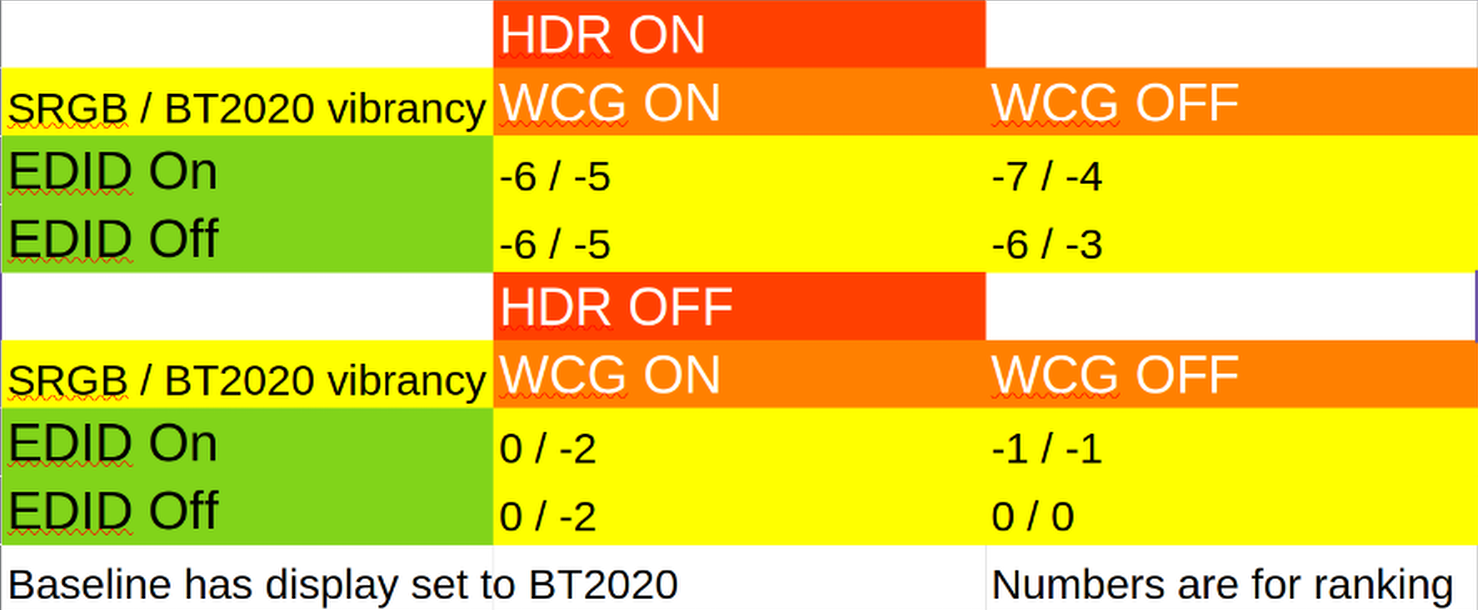Oh dang, I got excited about a new update. Then I started getting deja-vus. And finally I checked the date: This is from early May. Still a good read, unless you already did read it before :P
I've now added the date to the title to make it more clear the article is from two months ago. The article is a good read and wasn't posted on here, so I thought it's still worth sharing.
This doesn't mention the part where if you enable hdr, it sets the color profile to edid without an option to change it, which for my monitor makes everything very desaturated even in comparison to srgb mode (with no color profile)
That has pretty much nothing to do with the color profile, when colors look very desaturated on HDR screens, that's the driver messing up the colorspace signaling.
What GPU do you have? Both Intel and NVidia still have major problems with this.
Many displays (but not all, which is why it's not exposed in the GUI) also support doing HDR without additional colorspace signaling, you could try enabling only hdr and disabling wcg with kscreen-doctor. IMO the color part is the more noticeable benefit of HDR, but you could at least have functional HDR until your GPU driver is fixed.
I had thought it was about the color profile because with hdr disabled from system settings, enabling the built in color profile desaturates colors quite a bit and does some kind of perceived brightness to luminosity mapping that desaturates bright / dark hdr content even more. Although I don't think that's the cause of my problems anymore.
Thanks to your tip about kscreen-doctor, I could try different combinations of hdr / wcg / edid and see how the colors look with different combinations:

I think there must be something wrong with my screen since the hdr reduces saturation more than anything else. Anyways, thanks for the good work
Edit: Tried this with an amd gpu. hdr+wcg works as expected without muted colors. hdr without wcg still significantly desaturates colors, so I guess that's a monitor bug. Now to figure out gpu passthrough.. (Edit 2: It seems to just work??)
Side note, when I turn off hdr only from kscreendoctor the display stays in hdr mode until it turns off and on again, that didn't happen with nvidia
Edit 3: Found something weirder... Hdr colors are muted on nvidia gpu and seems vibrant with the amd igpu. If I plug the monitor to the motherboard (amd), enable hdr, then unplug and plug it into the nvidia gpu, the colors are still vibrant??? I can disable and enable hdr again and again and they aren't affected. They're even fine when hdr is enabled without wcg???? But if I fully turn off the monitor and back on they once again become muted with hdr. Weird ass behavior
enabling the built in color profile desaturates colors quite a bit and does some kind of perceived brightness to luminosity mapping that desaturates bright / dark hdr content even more
It maps the colors to be more correct, and it does use the brightness info from the EDID for HDR content, so that checks out.
I think there must be something wrong with my screen since the hdr reduces saturation more than anything else
It might enable some sort of gamut mapping on the display side... HDR on monitors is really weird sometimes.
Side note, when I turn off hdr only from kscreendoctor the display stays in hdr mode until it turns off and on again, that didn't happen with nvidia
I think that's a bug in amdgpu. It should force a modeset on hdr change, but it doesn't.
~~It specifically does mention that though. In Plasma 6.1 you can choose EDID, custom ICC profile or no profile.~~
You can't with hdr as I said. Check it yourself if you want
I guess you're right. I should've upgraded first and checked it, oh well.
I find that ironic as in SDR mode Plasma says EDID colour profiles tend to be very inaccurate
I’m just hoping wlroots can copy these any day now. Color management (& DisplayLink) are my 2 Wayland blockers.
are my 2 Wayland blockers.
Reset the clock boys! The Wayland blockers are back!
(Jk, I too am still in X11, since Autokey is my Wayland blocker)
Once you switch to Wayland you'll start having X11 blockers pretty fast :)
I run Wayland on my desktop, but there's nothing (in my flow) that I miss on my work or travel laptop (which are both X11)
I guess external monitors are a little clunky on my work laptop, but monitor profiles on XFCE solve the problem (and that's assuming I wouldn't have issues on Wayland, too).
I'm not a Wayland hater, I just don't have much benefit from it and am waiting for XFCE and the accessibility APIs to get better before I switch.
Linux
From Wikipedia, the free encyclopedia
Linux is a family of open source Unix-like operating systems based on the Linux kernel, an operating system kernel first released on September 17, 1991 by Linus Torvalds. Linux is typically packaged in a Linux distribution (or distro for short).
Distributions include the Linux kernel and supporting system software and libraries, many of which are provided by the GNU Project. Many Linux distributions use the word "Linux" in their name, but the Free Software Foundation uses the name GNU/Linux to emphasize the importance of GNU software, causing some controversy.
Rules
- Posts must be relevant to operating systems running the Linux kernel. GNU/Linux or otherwise.
- No misinformation
- No NSFW content
- No hate speech, bigotry, etc
Related Communities
Community icon by Alpár-Etele Méder, licensed under CC BY 3.0